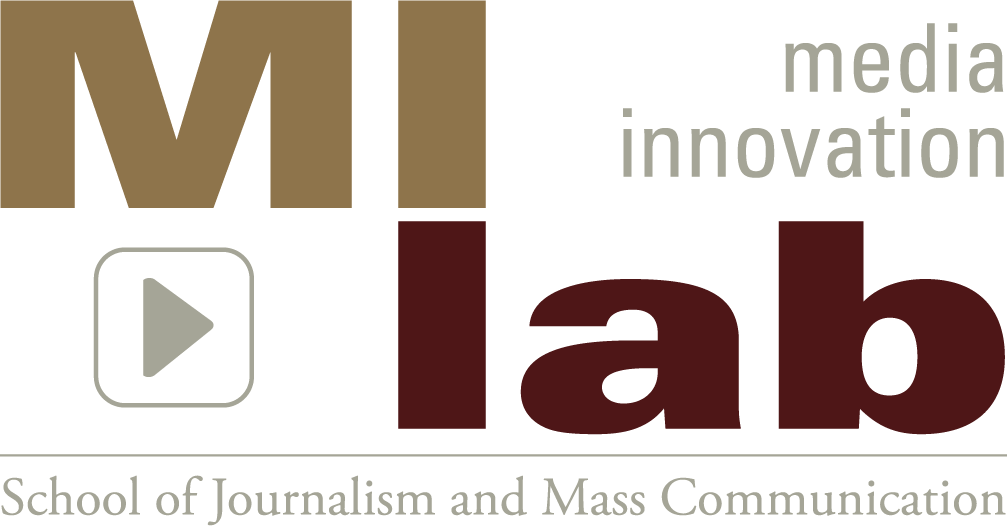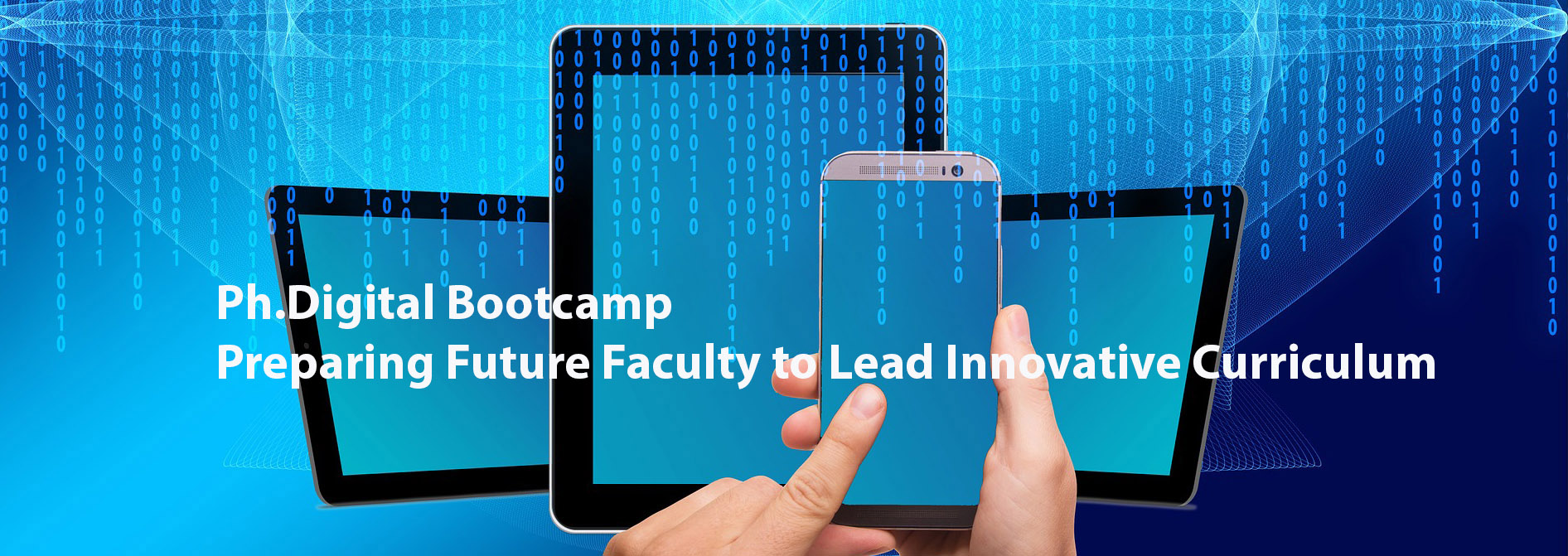Welcome to PhDigital Online!
Applications for the Summer 2022 session closed on Feb. 28. We will notify applicants of their status for the Summer 2022 PhDigital cohort by the end of March.
Read on for details on the program and how it is being adjusted to a completely online format. Deadline for applications is Feb. 28, 2022 by midnight CT.
The global pandemic has affected much about how we work and live. We went online for teaching and learning. We ordered groceries online and picked up dinner from curbside offerings from restaurants. We binge watched lots of entertainment and utilized a range of digital products that helped us get through this challenging time. We dealt with the challenges of misinformation and experienced the ways in which digital media could influence social causes. There is no doubt that the Covid-19 pandemic accelerated digital innovation in ways both expected and unexpected.
That is why the training provided by the PhDigital Bootcamp is more critical than ever in helping prepare faculty for the challenges associated with the digital world. For the three years, the PhDigital Bootcamp trained doctoral students and early career faculty in a range of digital concepts in both an online and in-person setting. Sixty fellows have completed the program. In 2020, we pivoted to a completely online session in order to contend with the situation created by the global pandemic. We learned a lot about online education associated with delivering digital media training, and we want to continue sharing with the academic discipline.
To meet the needs of more applicants, we will be offering the bootcamp in a completely online format during the summer of 2022. We are opening up the applications to PhD students and any faculty at a college or university in a media, mass communication or related program, regardless of degree status or time in position.
The Ph.Digital Bootcamp prepares mass communication faculty to become digital scholar-educators and lead curriculum innovation. The program is organized around concepts and skills associated with managing digital products: audience analysis and emerging technologies… immersive storytelling… data analytics and visualization… digital strategy…HTML5, CSS3, JavaScript… social media… virtual reality… drones… bots and more. These topics represent emerging areas and skill sets included in position descriptions for faculty as well as the range of positions for which our students are applying.
In 2022, the PhDigital Bootcamp will be delivered completely online. For 6 weeks in the summer, selected fellows will complete weekly, asynchronous, online modules with a synchronous Zoom on Fridays. The program is limited to 20 participants who will be competitively selected. Each module will be accompanied by resources and discussion for teaching these topics in an online setting.
The program is free to selected participants, thanks to support from the John S. and James L. Knight Foundation. Instructors in the program include faculty from the Media Innovation Lab in the School of Journalism and Mass Communication at Texas State University, as well as professionals and past PhDigital fellows working in the topic areas of the bootcamp.
Deadline for applications is Feb. 28, 2022 by midnight CT.
Program
The program has recruited faculty and advisers from the SJMC and media community who are leaders in virtual reality and 360 video, data, social media, drones, coding, multimedia storytelling and media innovation. Watch the video below to learn more about the activities during the 2018 PhDigital Bootcamp.
Weekly, asynchronous, online modules will lead up to a synchronous online session on Fridays. Online modules include video lessons, discussion posts and quizzes. These online modules will be offered in a flexible, asynchronous format, so that participants are able to easily work them into their schedules. Weekly, live video sessions will allow students to work with faculty on exercises and discussions that engage the material from the online sessions.
Doctoral students and faculty from media, mass communication or related programs are encouraged to apply. (Stayed tuned for 2022 Applications coming in Dec. 2021) While previous digital experience is not necessary, we are seeking participants who have a strong interest in teaching and research agendas that deal with emerging, digital topics. Be specific in crafting your answers on the application.
Participants in the 2018 class had this to say about the program:
I attended the PhDigital Bootcamp in a moment of transition; I had just finished my dissertation and PhD, and I was a few months away from starting a faculty position at the Grady College of Journalism and Mass Communication at the University of Georgia. This program provided the perfect bridge between these worlds. I gained emerging digital knowledge and skill sets, but I also gained the confidence to pursue a forward-thinking agenda in my role as a journalism academic professional. Since the Bootcamp, I have successfully redesigned and relaunched the Grady Newsource website (http://gradynewsource.com); added a seven-person digital team to its broadcast capstone; and crafted, along with some amazing Grady colleagues, a digital-first paradigm for all our capstone students. I’ve also been able to pull interactive, digital tools and data concepts into the two courses I teach, one on graphics for journalists and the other a deep, multi-platform dive into housing. The spirit of the Bootcamp was experimentation and innovation, grounded in solid reporting and journalistic ethics, and that worldview has now spread among my students and their work. It is without hesitation that I recommend the PhDigital Bootcamp program, not just to improve educators’ abilities with digital tools, but as an essential foundation for what journalism education should be for the future.
– Amanda Bright, Grady College of Journalism and Mass Communication, University of Georgia.
The PhDigital Bootcamp at Texas State University has been one of the most transformational experiences for me as a doctoral student. The incredible team of faculty members and guest speakers put together one of the most comprehensive, exhaustive and well-structured programs imaginable. This Bootcamp has helped provide me with a roadmap for learning emerging digital media trends and for incorporating them into both teaching and research. Given the pace of change taking over the world of communication and technology, newly minted doctorates are considered a more desirable hire when they know how to work with emerging media. I highly recommend the PhDigital Bootcamp to all doctoral students and new faculty members who are interested in building a progressive academic agenda for the field of media and communication.
– Sreyoshi Dey, Ph.D. Candidate, S.I. Newhouse School of Public Communications, Syracuse University
Frequently Asked Questions
Each module will be accompanied by resources and discussion around teaching the topic online.
About the John S. and James L. Knight Foundation
The John S. and James L. Knight Foundation is a national foundation with strong local roots. We invest in journalism, in the arts, and in the success of cities where brothers John S. and James L. Knight once published newspapers. Our goal is to foster informed and engaged communities, which we believe are essential for a healthy democracy. For more, visit knightfoundation.org.

About the Media Innovation Lab
The School of Journalism and Mass Communication opened the Media Innovation Lab (MILab) in Fall 2016. The MILab provides Texas State University with a central point for a broad range of digital media activities – scholarship, curriculum, courses, faculty development, community networking and events. Users are able to experiment with 360 video, drones, sensors and other emerging technologies and receive training in a range of web development and social media techniques. MILab faculty are committed to continuous learning and staying on the cutting edge of the intersection of technology and communication.

About the School of Journalism and Mass Communication
The School of Journalism and Mass Communication, housed in historic Old Main, offers a nationally accredited curriculum that introduces graduate and undergraduate students to the broad framework of mass communication, emphasizing what is fundamental to advertising, journalism, public relations, electronic media and the newest degree in digital media innnovation. The mission of the School of Journalism and Mass Communication is to pursue excellence and innovation in media education. Our programs strive to cultivate strong professional, research, theoretical, critical and ethical skills in a diverse and engaging environment that prepares students to be socially responsible media professionals, scholars and citizens.
Contact
For more information about the program, contact Dr. Cindy Royal, croyal [at] txstate.edu.
